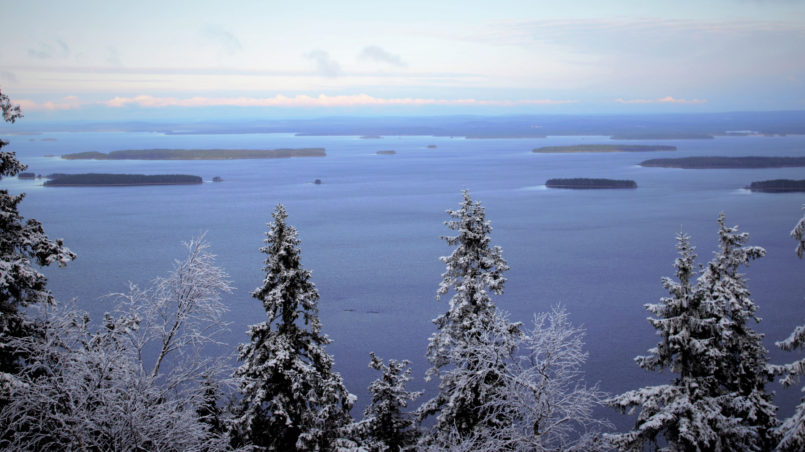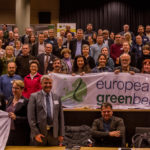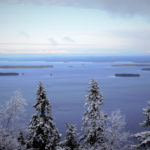Prometheus’ Consolation – The Green Belt

Event data
- Datum
- 31. 10. 2016
- Host
- Finnisches Ministerium für Landwirtschaft & Umwelt & Euro Natur sowie European Greenbelt Association
- Location
- Koli Conference Centre im Koli National Park: Address: Ylä-Kolintie 39, 83960 Koli (Lieksa), Finland
- Event-type
- Conference
- Participants
- Kimmo Tiilikainen, Minister of Agriculture and Environment (video)
- Risto Poutianen, Regional Mayor, Regional Council of the North Karelia
- Timo Tanninen, Executive Director, Parks and Wildlife Finland
- Alexander Kryshen, Vice-president, Karelian Research Centre RAS
- Bjorn Arne Naess, Norwegian Environment Agency
- Gabriel Schwaderer, Executive Director, EuroNatur; Chair of the European Green Belt Association
- Dr. Uwe Riecken, Head of Department, Biotope Protection and Landscape Ecology, German Federal Agency for Nature Conservation (BfN)
- Stefan Leiner, Head of Biodiversity Unit, DG Environment, European Commission
In the late afternoon of a Tuesday in November, we were sitting in the Alpha pub at the “Square of Peace” (formerly “Emperor’s Square”, then “Square of the Republic”, followed by “Hitler’s Square”…) in a small town close to the border, working intently on the honourable continuation of the local beer culture, deepened in a political discussion.
The forester, the fireman, a few truck drivers, metalworkers, carpenters, pensioners, professional drinkers, a bunch of welfare cases and a few small dogs. Few women. It is to be expected that they were preparing the dinner ‑ except for the hard working waitress. You could see her dimly, sweeping amidst clouds of smoke, always present when an empty glass needed attention or when a glass, overturned in the heat of a verbal battle, threatened to flood a table.
The topics, as seems to be the case whenever one is lucky enough to meet the “simple folk”, were for the most part related to complaints about the evil nature of the world: the unfair economic system, the alleged fact that politics are criminal sub-humans, in their perfidiousness barely overtaken by their Muslim fellow citizens or any ‘non-locals’, above all, if they do not visually comply with the ‘norm’.
Now and then a little joke about same-sex love (accompanied by winks and groping of the table neighbour, as a backdrop, purely as friends, of course) and/or the weaknesses of women, the “educated”, Jews (yes, still) and… gypsies. Of course, everybody knows everything, is allowed to bawl out his opinion and to drink till the cows come home. We may as well exercise our freedom when Merkel and her vassals in Brussels already spoil our life. Well, no surprises here for the passionate people observer.
To give this tragicomedy a twist, I nonchalantly proposed a toast in remembrance of the 100th anniversary of the death of the last emperor – and surprisingly attracted mild criticism. I then also made a comment about climate change and… that hit home. Emotions were running high, I exposed myself as an idiot, blinded by the left-wing media, and immediately had to pay for a round, so that the early evening did not completely spiral out of control. But the forester’s interest had been aroused and, while saying cheers, he asked:
Were you not just at an ecology conference?
Yes, well…
28 years ago, when the Iron Curtain began to fall, civilians could, for the first time after almost four decades, once again enter the partly mined restricted area, which had been protected with walls, electric barbed wire, soldiers and sniffer dogs and which was partly mined. Years before, ornithologists had already made fascinating observations from afar about species threatened with extinction, which had apparently found a place to live undisturbed in the death zone between eastern and western Europe.
Closer examination quickly showed that this 12,500 km long stretch, between a few metres to several kilometre-long strips, had accidentally turned into one of the most biologically diverse areas of the world. The question was how to protect this treasure and use it responsibly now that history, and with it the relationship between neighbouring states, which had been separated for so long, had fundamentally changed.
At the beginning of November this year, the 9th Pan-European Conference of the EGB took place in Koli, Finland. As founding member of the newly grounded EGB Association in Slavonice, the Czech Republic in 2014, our organisation was invited in order to plan the implementation of future projects. And so I found myself once again in a conference hall, close to the summit of the Koli Mountain, a national shrine of the Finns, surrounded by representatives from variosus organisations from 28 countries.
The Finnish autumn was good to us and it snowed only lightly and, despite the late sunrise and the early sunset so close to the Arctic Circle, the mood was mostly relaxed – and focused on the work. Heavy topics were on the agenda, technically demanding as well as in terms of content. Nature conservation is a sensitive and difficult area. So many interests are involved and more so in precarious economic times.
Working groups did their utmost to find consensus in their respective area of focus and to present a result, the implementation of which would lead to relevant outcomes for all involved, i.e. ultimately for all living creatures associated with the affected area.
After the work was completed, it was time for the obligatory group photo. While the photographer was trying to find the best position for over 120 individuals, I looked around.
They kindly made space for the Romanians and the Austrians found a place somewhere in the middle. A space had to be made for an observer from Great Britain and a guest from Pakistan also joined the group.
In the evening, in the sauna (in Finland you wear swimwear when you are with „strangers“ in a sauna) we (almost) all met again. In one-to-one talks, in small groups, sweating, eating, drinking, and sometimes singing, we talked again about the day’s topics or spoke about something completely different.
I do believe that with most, I could feel a certain emotion that such an event was possible at all.
Fresh beer materialised in front of the forester and I, a friendly drunk wanted to hug us and the pub in the small town near the border sank in ever thicker clouds of smoke.
What do you mean by that?
asked the forester with a mischievous smile
But, of course: “Na zdraví” … to our health.
Translation German-English: Donna Stockenhuber
Credits
| Image | Title | Author | License |
|---|---|---|---|
 |
green-belt-Gruppenfoto | Alexander Stipsits | CC BY-SA 4.0 |
 |
Das grüne Band | Alexander Stipsits | CC BY_SA 4.0 |
